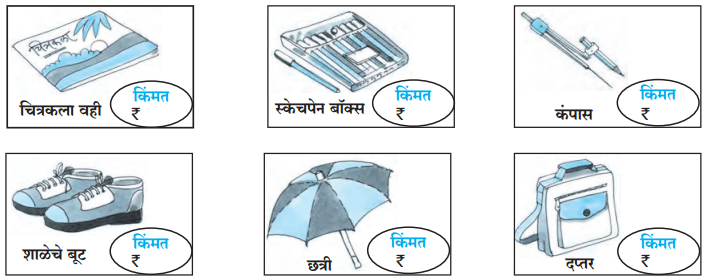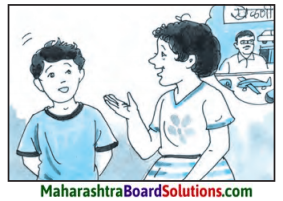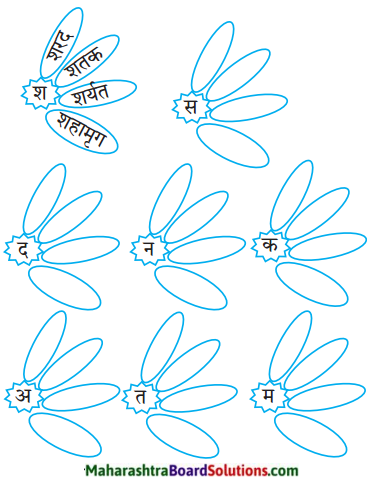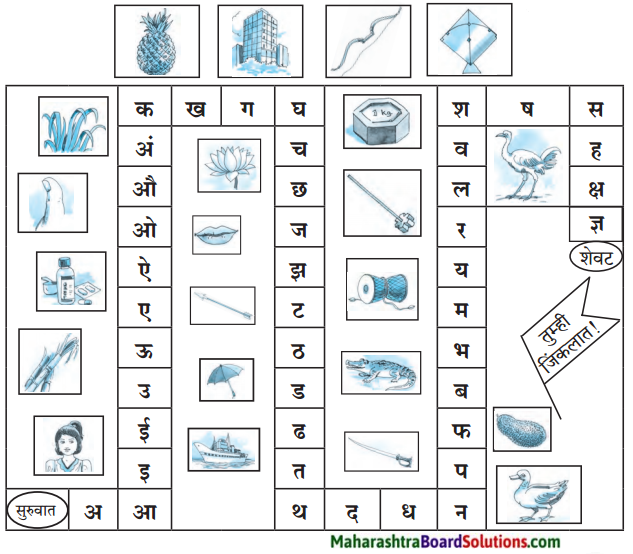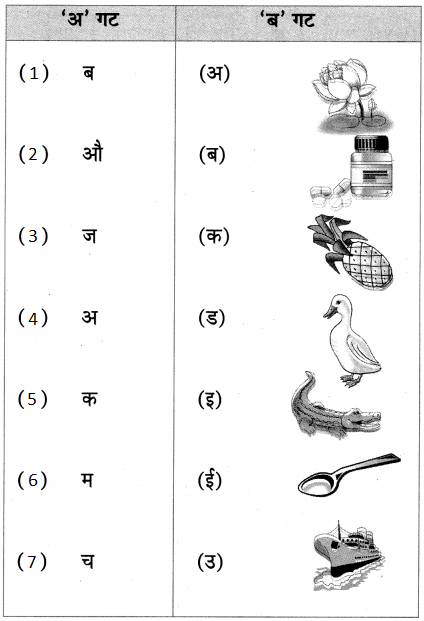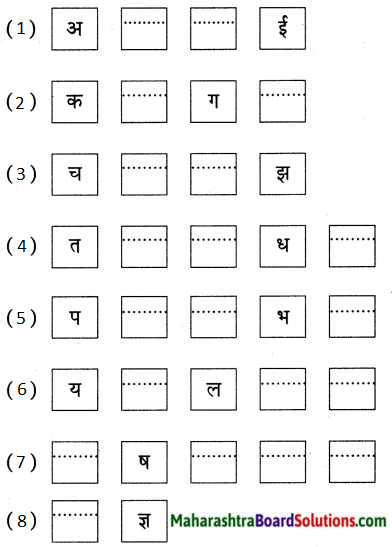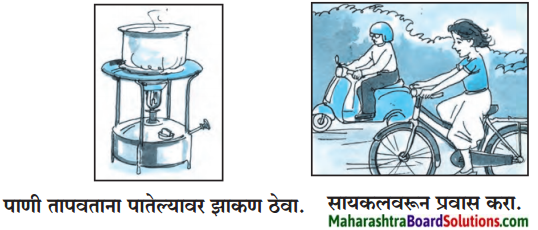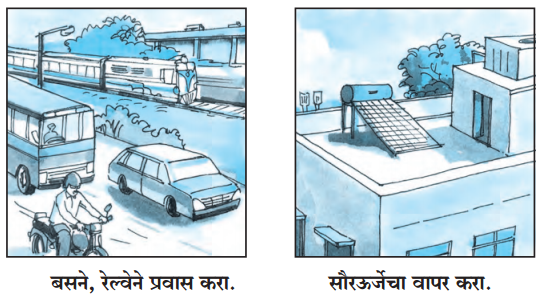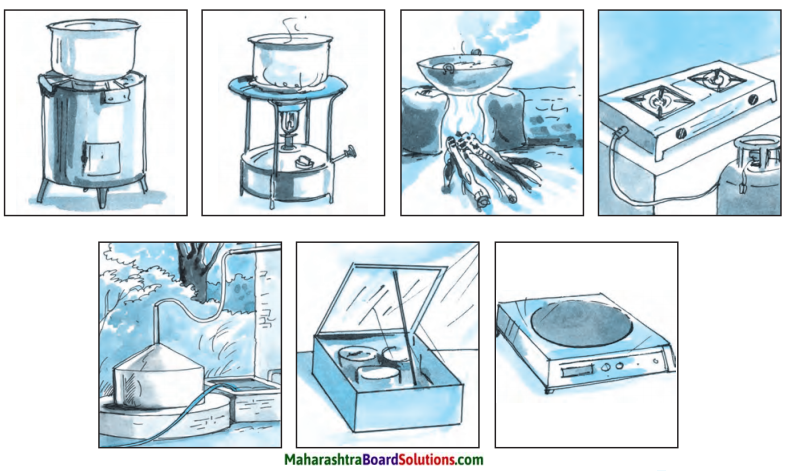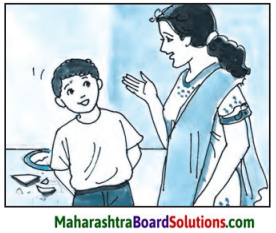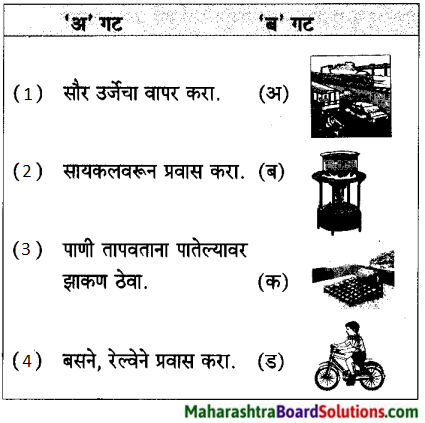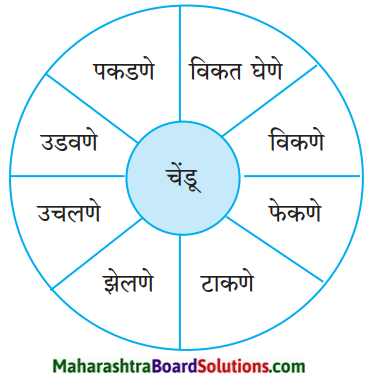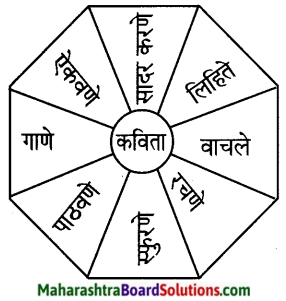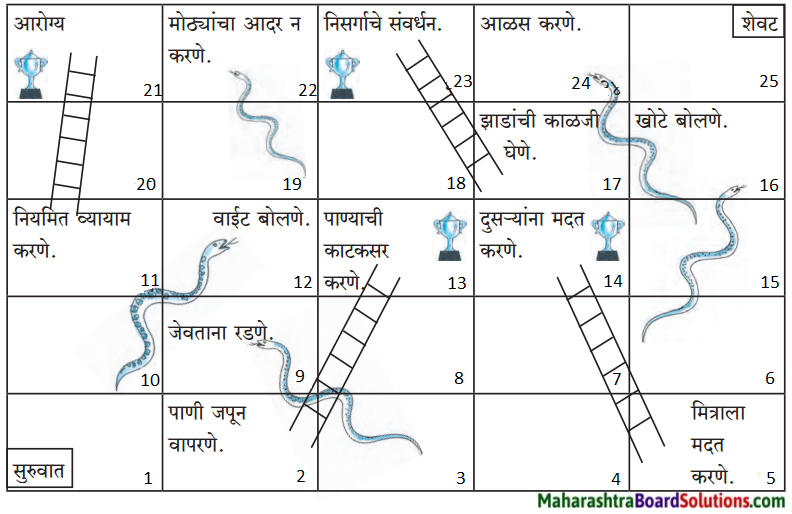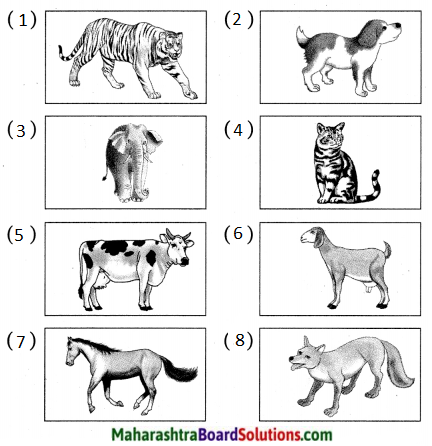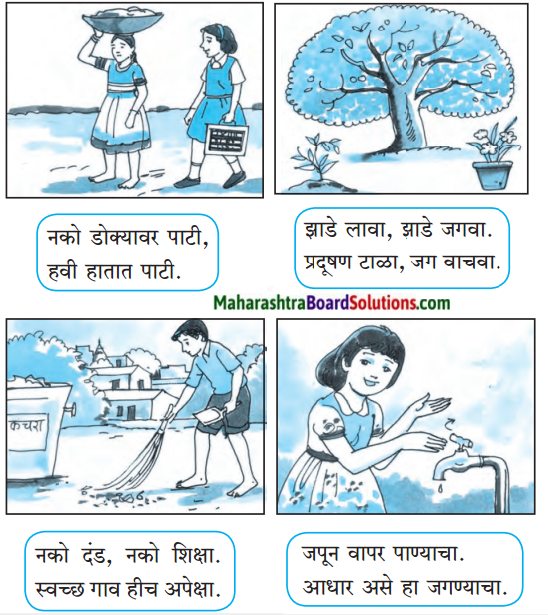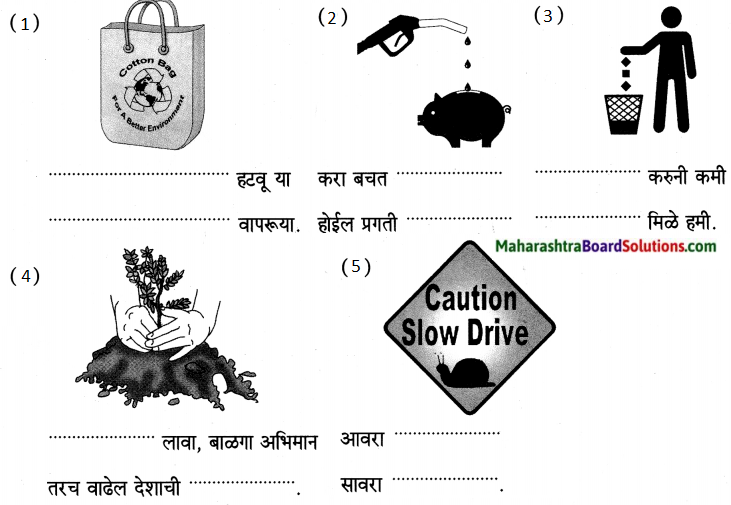Std 5 Hindi Lesson 20 गमतीदार पत्र Question Answer Maharashtra Board
Balbharti Maharashtra State Board Class 5 Marathi Solutions Sulabhbharati Chapter 20 गमतीदार पत्र Notes, Textbook Exercise Important Questions and Answers.
5th Std Hindi Poem Gamtidar Patra Question Answer
5th Standard Marathi Digest Chapter 20 गमतीदार पत्र Textbook Questions and Answers
1. एका वाक्यात उत्तरे लिहा.
प्रश्न (अ)
पत्र कोणी पाठवले?
उत्तर:
पत्र काकांनी पाठवले.
![]()
प्रश्न (आ)
पत्र कोणाला पाठवले?
उत्तर:
पत्र मायाला पाठवले.
प्रश्न (इ)
मायाला पत्र का वाचता आले नाही?
उत्तर:
पत्र कोरे असल्यामुळे मायाला ते वाचता आले नाही.
2. कोण ते सांगा.
प्रश्न 1.
कोण ते सांगा.
(अ) कोरे पत्र पाहून आश्चर्य वाटणारी –
(आ) कोरे पत्र वाचण्याची युक्ती माहीत असणारी –
उत्तर:
(अ) माया
(आ) रेश्मा
3. खालील शब्द असेच लिहा.
पत्र, मित्र, सत्र, रात्र, त्रयस्थ, पात्र, त्राण, वात्रट, कंत्राट.
प्रश्न 1.
पाठातील खालील वाक्ये वाचा.
(अ) दारावरची बेल वाजली.
(आ) ‘काकांनी कोरा कागद कसा बरं पाठवला?’
(इ) रेश्माने पत्र हातात घेतले.
(ई) “अगं, काकांनी कोरं पत्र पाठवलं.”
प्रश्न 2.
वाचा. समजून घ्या.
1. वाक्य पूर्ण झाल्यावर
असे चिन्ह देतात.
या चिन्हाला पूर्णविराम म्हणतात.
2. वाक्यात जेव्हा प्रश्न विचारलेला असतो, तेव्हा वाक्याच्या शेवटी ? असे चिन्ह देतात. ? याचिन्हाला प्रश्नचिन्ह म्हणतात.
3. वाक्य वाचताना शब्दानंतर आपण थोडे थांबतो. तसेच वाक्यात आलेल्या वस्तू/नावांची यादी वाचताना प्रत्येक शब्दानंतर आपण थोडे थांबतो, तेव्हा त्या शब्दानंतर , असे चिन्ह देतात. , या चिन्हाला स्वल्पविराम म्हणतात. वरील वाक्यांत (., ?) ही विरामचिन्हे आलेली आहेत
![]()
प्रश्न 3.
खालील वाक्यांत पूर्णविराम, प्रश्नचिन्ह व स्वल्पविराम घाला.
- मी संगणक सुरू केला मामाचा ई-मेल वाचला. काय म्हणतो मामा कधी येणार आहे तो घरी आईने विचारले. मामा चार दिवसांनी येणार होता आम्ही आनंदीत झालो
- रमेश गीता अनिता गणेश हे दररोज बागेत खेळतात
- तू जेवण केलेस का
- हे एकून तुला आनंद झाला का
- मी आई बाबा राजू पिंकी बाजारात गेलो
- सुशांत रघू राजेश हे चांगले मित्र आहेत
उत्तर:
- मी संगणक सुरू केला, मामाचा ई-मेल वाचला. काय म्हणतो मामा? कधी येणार आहे तो घरी? आईने विचारले. मामा चार दिवसांनी येणार होता. आम्ही आनंदीत झालो.
- रमेश, गीता, अनिता, गणेश हे दररोज बागेत खेळतात.
- तू जेवण केलेस का?
- हे एकून तुला आनंद झाला का?
- मी आई, बाबा, राजू, पिंकी बाजारात गेलो.
- सुशांत, रघू, राजेश हे चांगले मित्र आहेत.
वाचा व लिहा.
आपल्या घराभोवतीच्या परिसरात तुळस, दुर्वा, गवतीचहा, आले, लिंबू अशी अनेक औषधी झाडे असतात. झाडासारखा मित्र नाही. झाडे सावली देतात, फुले-फळे देतात, औषधे देतात. अशा शेकडो गुणकारी वनस्पती आपल्या जवळच असतात. आपण त्यांची माहिती जाणून घेतली पाहिजे.
Marathi Sulabhbharati Class 5 Solutions Chapter 20 गमतीदार पत्र Additional Important Questions and Answers
एका वाक्यात उत्तरे लिहा.
प्रश्न 1.
तुमच्याकडे घरपोच पत्र कोण घेऊन येतो?
उत्तर:
आमच्याकडे घरपोच पत्र पोस्टमन किंवा कधी कुरीयर – बॉयही घेऊन येतो.
![]()
प्रश्न 2.
मायाने कोणाचे आभार मानले?
उत्तर:
मायाने पोस्टमनचे आभार मानले.
प्रश्न 3.
मायाला आश्चर्य का वाटले?
उत्तर:
पत्रात काहीच लिहिलेले दिसत नव्हते, म्हणून मायाला आश्चर्य वाटले.
प्रश्न 4.
काकांनी पत्र लिहिताना कशाचा वापर केला होता?
उत्तर:
काकांनी पत्र लिहिताना लिंबाच्या रसाचा वापर केला होता.
प्रश्न 5.
पत्रातील अक्षरे केव्हा दिसू लागली?
उत्तर:
मेणबत्तीच्या ज्योतीची उष्णता पत्राला मिळताच पत्रातील अक्षरे दिसू लागली.
प्रश्न 6.
कोण ते सांगा.
मायाला पाकीट देणारा –
उत्तर:
पोस्टमन
थोडक्यात उत्तरे लिहा.
प्रश्न 1.
पत्रावरील अक्षरे दिसण्यासाठी रेश्माने काय केले?
उत्तर:
पत्रावरील अक्षरे दिसण्यासाठी रेश्माने त्या कोऱ्या पत्राला एका जळत्या मेणबत्तीवर धरले. त्याची उष्णता लागताच त्यावरील अक्षरे दिसू लागली.
प्रश्न 2.
मायाला आनंद का झाला?
उत्तर:
काकांनी पाठवलेले पत्र कोरे होते. त्यावर काही लिहिलेले दिसत नव्हते. त्यामुळे मायाला पत्र वाचता आले नाही. रेश्माला तिने पत्र दाखवले तेव्हा तिने ते पत्र मेणबत्तीवर धरले आणि त्या उष्णतेने पत्रातील अक्षरे दिसू लागली व ते पत्र तिला वाचता येऊ लागले, म्हणून मायाला आनंद झाला.
![]()
प्रश्न 3.
रेश्माने मायाला कोऱ्या पत्राचे गुपित कशाप्रकारे सांगितले?
उत्तर:
लिंबाच्या रसाचा उपयोग करून कागदावर लिहितात. लिहिलेले सुकल्यावर कागद कोरा दिसतो. तो कागद उष्णतेवर धरल्यास त्यावरील अक्षरे पुन्हा दिसू लागतात आणि आपल्याला ती अक्षरे वाचता येतात. रेश्माने मायाला कोऱ्या पत्राचे गुपित अशाप्रकारे सांगितले.
प्रश्न 4.
खालील शब्दांना पाठात कोणते शब्द आले आहेत ते सांगा.
- आश्चर्य
- गुप्त गोष्ट
- आभार
- गरमपणा
- काहीही न लिहिलेला कागद
उत्तरः
- नवल
- गुपित
- धन्यवाद
- उष्णता
- कोरा कागद
व्याकरण व भाषाभ्यास
प्रश्न 1.
समानार्थी शब्द लिहा.
- पाकीट
- धन्यवाद
- हात
- ज्योत
- उष्णता
- गंमत
- आनंद
- गुपित
- आश्चर्य
उत्तर:
- लिफाफा
- आभार
- कर
- ज्वाला
- उष्मा
- मजा
- हर्ष
- रहस्य
- नवल
प्रश्न 2.
विरुद्धार्थी शब्द लिहा.
- उघडे
- आतील
- धरणे
- सुकलेले
- आनंद
- आत
- उष्णता
- कोऱ्या
- एक
- उपयोग
उत्तर:
- बंद
- बाहेरील
- पकडणे
- ओले
- दुःख
- बाहेर
- गारवा
- लिहिलेल्या
- अनेक
- दुरुपयोग
![]()
प्रश्न 3.
वचन बदला.
- दार
- पत्र
- मेणबत्ती
- ज्योत
- टाळी
- गंमत
- अक्षर
- पाकीट
उत्तर:
- दारे
- पत्रे
- मेणबत्त्या
- ज्योती
- टाळ्या
- गंमती
- अक्षरे
- पाकीटे
प्रश्न 4.
लिंग बदला.
- काका
- मित्र
- त्याने
उत्तर:
- काकू / काकी
- मैत्रीण
- तिने
प्रश्न 5.
खालील वाक्यांत पूर्णविराम, प्रश्नचिन्ह व स्वल्पविराम घाला.
- आईने बाजारातून केळी सफरचंदे द्राक्षे ही फळे आणली
- शिवाजी महाराज पराक्रमी होते
- मुलांनो तुम्ही दररोज वर्तमानपत्र वाचता का
- लोकमान्य टिळकांनी शिवजयंती गणेशोत्सव हे उत्सव सुरू केले
उत्तरः
- आईने बाजारातून केळी, सफरचंद, द्राक्षे ही फळे आणली.
- शिवाजी महाराज पराक्रमी होते.
- मुलांनो, तुम्ही दररोज वर्तमानपत्र वाचता का?
- लोकमान्य टिळकांनी शिवजयंती, गणेशोत्सव हे उत्सव सुरू केले.
गमतीदार पत्र Summary in Marathi
पाठ्यपरिचय:
या पाठात कोऱ्या पत्रामागचे शास्त्रीय कारण रेश्माने मायाला सुंदर रितीने स्पष्ट केले आहे.
![]()
शब्दार्थ:
- दार – (a door)
- मजकूर – कागदावर लिहिलेले – (matter)
- कोरा – काहीही न लिहिलेला (blank)
- आश्चर्य – नवल (surprise)
- मेणबत्ती – (a candle)
- ज्योत – ज्वाला (a flame)
- गंमत – मजा (fun)
- उष्णता – गरमपणा (heat)
- टाळी – (clap)
- लिंबू – एक फळ (a lemon)
- गुपित – रहस्य – (a secret)
- पोस्टमन – पत्र घरी पोहोचवणारा – (postman)
- पाकीट – लिफाफा – (an envelope)
5th Standard Marathi Digest Pdf Download
- नदीचे गाणे Class 5 Marathi Question Answer
- मी नदी बोलते Class 5 Marathi Question Answer
- आमची सहल Class 5 Marathi Question Answer
- पैशांचे व्यवहार Class 5 Marathi Question Answer
- अनुभव-२ Class 5 Marathi Question Answer
- गमतीदार पत्र Class 5 Marathi Question Answer
- छोटेसे बहीणभाऊ Class 5 Marathi Question Answer
- वाचूया लिहूया Class 5 Marathi Question Answer
- प्रामाणिक इस्त्रीवाला Class 5 Marathi Question Answer
- ऐका पहा करा Class 5 Marathi Question Answer
- मालतीची चतुराई Class 5 Marathi Question Answer
- पतंग Class 5 Marathi Question Answer
- महर्षी विठ्ठल रामजी शिंदे Class 5 Marathi Question Answer
- फुलपाखरू आणि मधमाशी Class 5 Marathi Question Answer

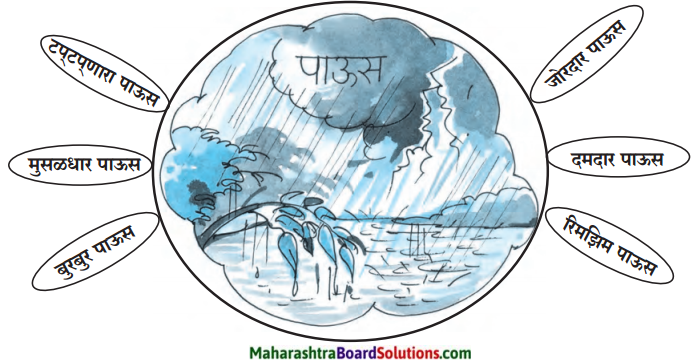
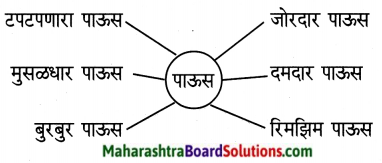
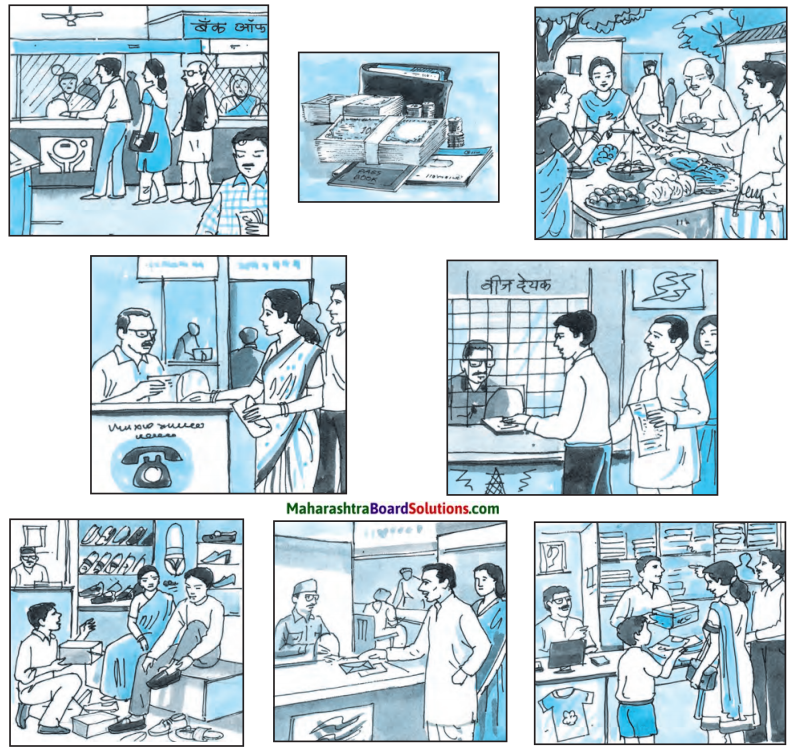 उत्तरः
उत्तरः